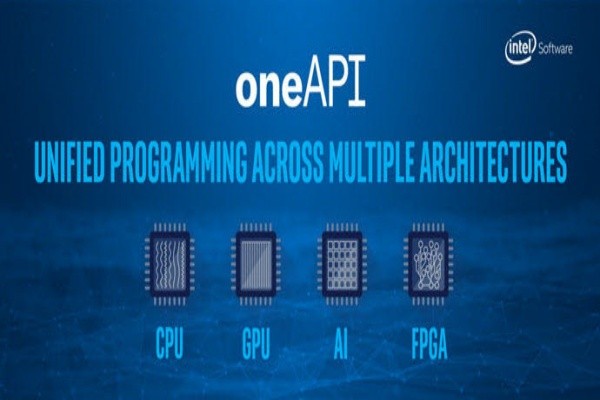Intel is preparing to launch a comprehensive software called “Intel oneAPI toolkit” that maximizes capabilities of CPU, GPU, and FPGA (Field-Programmable Gate Array). This software allows app developers to utilize various types of chips easily and conveniently through single program.
Intel will officially launch the tookit early next month. “This moment is extremely meaningful in our ambitious journey in oneAPI.” said Senior Vice President Raja Koduri of Intel. “oneAPI includes a wide range of architectures as well as the current CPU programming.”
Intel’s oneAPI toolkit has been going through an ambitious development by Intel since 2018 under the keywords standard, openness, and integration.
Many different types of chips such as CPU, GPU, FPGA go into latest IT devices depending on the device’s operation area. However, app developers are feeling more burdensome as functions and applications of semiconductors continue to increase and expand. In order for a developer to utilize appropriate chip for a software, he or she needs to familiarize with the code for each individual chip.

In order to minimize such burden for developers, Intel has developed “oneAPI toolkit”. This toolkit is based on a new comprehensive programming language called “DP (Data Parallel) C++” and it can freely go over code barriers of CPU, GPU, and FPGA.
Software that was already developed before the development of oneAPI toolkit can be converted to fit oneAPI. Software based on CUDA, which is a development platform by NVIDIA, can also be converted to fit DP C++. The platform is operated based on an open souce. Intel plans to provide an open platform “DevCloud” that allows developers to utilize oneAPI without having to install a separate server.
Intel looks to expand its semiconductor business by putting efforts into oneAPI. The company has officially entered the global CPU and FPGA markets recently. On November 12, it introduced a server GPU called “SG1”. It acquired a FPGA company called Altera back in 2015 and recently introduced a relevant product called “eASIC N5X”. These moves indicate that the company is also working to standardize software at the same time so that users can quickly enter its expanding chip ecosystem.
Intel has been focusing on expanding the global computing industry by pushing for various standards. Universal I/O standards such as PCI Express, USB, and Thunderbolt were created under the supervision of Intel.
Staff Reporter Kang, Hyeryung | kang@etnews.com